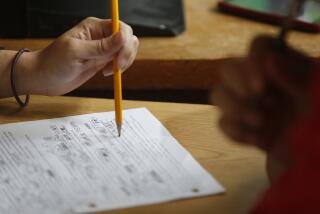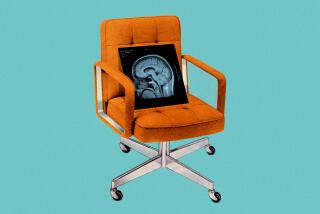SCIENCE FILE: An exploration of issues and trends affecting science, medicine and the environment. : Taming Those Exam Jitters : An experimental computer test allows the students to control the level of difficulty. The result, experts say, is less anxiety and far more accurate scores.
- Share via
What would the SAT be without sweaty palms? The bar exam without vampire bats flapping in your stomach? Or the Graduate Record Exam without fingernails bitten raw?
The answer, researchers say, is a better, more accurate test.
Mind-numbing, heart-thumping anxiety is the bane of thousands of students who take standardized tests each year. Experts say that examination jitters can deflate scores as much as 10% to 15%--enough to get a college application tossed into the reject pile, or keep an architect-to-be from getting a license.
Test makers, true to their tradition, have tended to view such pain and suffering as someone else’s problem.
Now, researchers are trying to design a more enlightened test, unclouded by the psychological contaminant of stress.
Called “self-adapted” testing, it tackles the anxiety factor by allowing the test taker to control the difficulty level of the questions and receive immediate feedback after answering each item, features meant to bolster the examinee’s sense of control and defeat the more usual swirl of doom.
Although several years away from large-scale use, the kinder, gentler test excites people such as Jane Crawford, head of undergraduate counseling at UCLA, where about 1,000 students seek help each quarter for test anxiety.
“It’s a very widespread problem,” Crawford said. “You see a whole range of reactions, from physical illness to inability to write and carry on with the test. I’ve had students say, ‘I just sat and looked at the questions for two hours.’ They just freeze.”
The experimental test, which must be administered by computer, is controversial, provoking worries that a wily examinee could hike his or her score by deliberately choosing easy items.
Researchers acknowledge that that is a problem but say it is not insurmountable. University of Iowa educational psychologists Thomas Rocklin and Walter Vispoel, who have conducted much of the leading research on self-adaptive testing, are determined to find ways to thwart potential fakers because they believe that relieving examination hell has powerful benefits.
“The reason you want to get rid of anxiety is that it’s not allowing people to represent their true level of skill,” said Vispoel, an associate professor of statistics and measurement at Iowa’s College of Education, where some of the country’s oldest and most widely used standardized tests were developed. “If people are anxious, they can’t think straight, can’t concentrate.”
Research has shown a complex relationship between anxiety and test success. In a study conducted in the early 1980s, Rocklin found that low anxiety hurt performance on an easy vocabulary test while moderate anxiety tended to help. On a more difficult test, the opposite pattern emerged, with the less anxious generally outscoring the moderately anxious.
But high anxiety was always a disadvantage, causing the most nervous examinees to do badly regardless of the difficulty level.
Rocklin began to wonder if tests could be tailored to adjust to each student’s internal anguish meter.
Rocklin and Vispoel believe that this type of exam would most benefit the estimated 10% to 20% of students thought to suffer high levels of test stress.
The self-adaptive test is the latest twist in a trend toward standardized tests in computerized formats. The chief reasons for computer administration have been convenience and efficiency, however, not stress relief.
*
For example, the old pencil-and-paper version of the Graduate Record Exam used for graduate school admissions is only offered about five times a year, but the new computerized format is available year-round at commercial centers nationwide. These so-called computer adaptive exams also allow tests to be more individualized and less of an ordeal, time-wise. A person who gives right answers to progressively harder questions can shave as much as an hour off the GRE because the computer would give greater scoring weight to that response pattern.
In self-adaptive testing, the examinee, rather than the computer, picks the difficulty level of each question.
The test items are organized according to several levels, from very easy to extremely difficult. Rocklin and Vispoel have used six to eight levels, with 30 to 40 questions in each.
The test starts by asking the examinee how hard the first question should be. The computer then offers an item from the category chosen. If the question is answered incorrectly, the test taker would have the option of asking for the next item to be easier. Or, if the person got the question right and was feeling confident, he could ask for the next item to be tougher.
The test would continue this way until the examinee answered enough questions to produce a reliable score.
Rocklin and Vispoel, in a study last year, found that students could inflate their scores on self-adapted tests. But they concluded that such deception was usually detectable. And not without remedy. As in conventional tests, examinees who produce suspiciously high scores can be asked to retake the exam or else have their scores thrown out.
The researchers said they are also considering mechanisms that would force people to choose more difficult items if they answer too many low-level questions correctly.
It is also possible to score the test using item-response theory, a sophisticated formula that would take into account the difficulty levels chosen and weight the responses accordingly, said Howard T. Everson, senior research scientist for the College Board and a supporter of self-adapted testing. That would make it possible for a person who answered 70 difficult questions correctly to score higher than someone who got 100 easy questions right.
Studies have shown that examinees allowed to adjust the difficulty level of test items had less anxiety. Steven Wise, a University of Nebraska educational psychologist, has found that they also wind up with higher scores--a difference equivalent to as much as 20 or 30 points on the SAT.
Wise, whose work focuses on the psychology behind the self-adapted test, believes that “perceived control” is the key to why it seems to help.
*
He noted that studies have shown that elderly people feel less stress if they are given more choices about what they can eat or activities they can pursue. Similarly, patients in pain feel better and require smaller doses of painkillers if they are able to self-administer the medication.
“Because they are more in control, they are better able to tolerate an uncomfortable situation,” Wise said. “My theory is that is largely what is going on with self-adaptive testing. Essentially, anxious people are given more control, which makes them less anxious and [results in] better test performance.”
Skeptics abound, however. G. Gage Kingsbury, testing coordinator for the Portland Public Schools, said an experiment in his district comparing conventional and adaptive tests found no differences in students’ performance. Although he believes that a test that cuts anxiety would be valuable, Kingsbury said the potential for problems is greater than the potential for gain. The fact that “a really great student can opt to take the easiest test questions” is a flaw that he wants to see fixed.
Everson, the College Board official, agrees that the fake factor must be addressed. “That is the major disadvantage right now,” he said.
But convincing the public that the test cannot be manipulated might be tricky, Everson added, noting that the computerized GRE launched last year already has encountered challenges that it is not cheat-proof. Resistance could also come from testing companies, which may be disinclined to invest in a test that will cost more to develop because it requires more test items.
“I think that is the largest obstacle of all,” said Wise, the University of Nebraska testing expert. “Test companies are driven by time, cost and efficiency. But from the standpoint of the examinee, the studies so far seem to indicate it is a pretty good idea.”
(BEGIN TEXT OF INFOBOX / INFOGRAPHIC)
Stress Test
On a self-adapted test, the examinee would tell the computer how easy or hard the first question should be. The difficulty level of each succeeding question can be adjusted depending on how confident the examinee feels or how well the previous item was answered. Here is a look at how one such test might proceed.
Source: Thomas Rocklin, University of Iowa.







